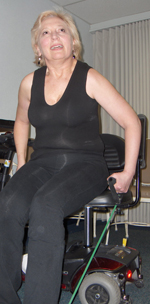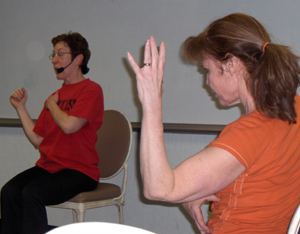 |
Janelle Baber of Omaha was diagnosed with multiple sclerosis 12 years ago. The jazzercise class she attends every Monday and Wednesday in the basement of the Storz Pavillion in the Clarkson Tower has helped her to improve the left and weaker side of her body. |
It’s Wednesday night and time for jazzercise class in the basement of the Storz Pavilion in the Clarkson Tower.
In the back row, four women mirror the instructor, keeping pace with her every air-punch. In the next row, it’s a slightly different story. A few of the women are sitting down, doing the arm exercises and attempting the kicks.
Closer to the front sits Janelle Baber in her motor scooter, performing the aerobic activity at her own pace. She uses her hands to help move her feet, incorporating resistance tubes and hand weights when she can.
Baber has multiple sclerosis, as do most of the women who attend the class. The autoimmune disease attacks the central nervous system causing mild to severe symptoms ranging from numbness in the limbs to paralysis and loss of vision.
Symptoms vary greatly from person to person, thus the reason for the varying degree of abilities in the jazzercise class.
“You might feel frustrated if you’re watching people march and jump around, but with this setup I feel like I’m doing well,” Baber said.
The 54-year-old Omahan is doing well. Better, she said, than she was before joining the class. Diagnosed 12 years ago, Baber’s MS has progressively gotten worse, weakening the left side of her body, but things are looking up.
|
She has Kathy Healey, Ph.D., a nurse practitioner in the neurological sciences department and the UNMC MS clinic, to thank for that.
Dr. Healey is the brains behind the jazzercise for MS patients program. She got the idea while dancing to a remix in a jazzercise class at her gym.
“I just thought to myself, ‘this would be great for people with disabilities because it’s just so upbeat and motivating,'” Healey said.
Funded by a Nebraska Chapter Multiple Sclerosis Society grant, the pilot program began about two months ago.
“The physical and social benefits of this jazzercise class have been invaluable to people living with MS,” said Kristi Harvey-Simi, director of client programs and services with the National MS Society Nebraska Chapter. “One of our major goals at the society is to help improve the quality of life for our clients. We are proud to have been part of this pilot project, and we look forward to supporting this program as it continues to grow.”
So far, evaluations have revealed that people are willing to pay out-of-pocket to attend the classes.
“I take care of people with MS and have found that after their formal physical therapy program, they find it hard to incorporate regular exercise into their lives,” Dr. Healey said. “They’d try to do it at home, but it just didn’t work. Most people do better in group settings, where there’s more social interaction and a sense of accountability.”
Baber can attest to that. During a recent week-long break between classes, she tried to jazzercise on her own, but found it just wasn’t the same.
 |
Kathy Healey, Ph.D., right, a nurse practitioner in the Neurological Sciences Department and UNMC MS clinic, concentrates on her abdominal exercise while Mary Beth Bradeau instructs the jazzercise class for multiple sclerosis patients. |
Fatigue and overheating are common issue with MS, but Baber said she has been impressed by the length of time she has been able to exercise without overheating since joining jazzercise. Dr. Healey explained why.
“Aerobic exercise helps with fatigue, and it also helps to build muscles for strength and balance,” she said. “It leaves people energized and feeling better.”
Also helping with the energy level is Mary Beth Brandeau and Sally Lorenzen, the jazzercise instructors. A physical therapy assistant by day, Brandeau is attuned to issues that arise when those with disabilities exercise, so she modifies her moves for them. She also sings along to the lyrics, cracks jokes and interacts with the class.
“She makes it fun, so it’s not like a chore to exercise,” said Dr. Healey, who participates in the classes. Dr. Healey along with nurses from the MS clinic — Terry Munsinger and Dottie Norgard — are there to provide support and assistance to women who need it. Participants are also welcome to bring a buddy to help them for free if they like.
Baber does most everything on her own. It makes class feel more like a “regular” jazzercise that way.
“It’s like I feel normal,” she said. “We’re just like other people going to jazzercise class — we laugh, we moan, we sweat and at the end, we feel productive.”